 | TODAY IN SCIENCE HISTORY NEWSLETTER - 24 MARCH |
| Feature for Today |
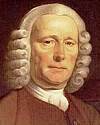 On 24 Mar 1693, John Harrison was born, the English clockmaker who devoted most of his life to building more and more accurate marine chronometers. Obviously, the best pendulum clock on land would be worthless on a sailing vessel, constantly tossed by the sea. Yet it was only by knowing time accurately that the latitude of a ship's location could be properly determined. On 24 Mar 1693, John Harrison was born, the English clockmaker who devoted most of his life to building more and more accurate marine chronometers. Obviously, the best pendulum clock on land would be worthless on a sailing vessel, constantly tossed by the sea. Yet it was only by knowing time accurately that the latitude of a ship's location could be properly determined.Just as in modern times, the invention of the GPS was a jaw-dropping advance for navigation, so in Harrison's time, it was an accurate marine chronometer that was the holy grail. Parliament offered a huge reward to the inventor who solved the inherent problems in chronometer design. (Those included, for example, temperature compensation.) Many others tried; all failed. Harrison's dogged determination through four decades finally paid off, with the refinement of his Longitude Watch. This chapter, John Harrison and the Longitude Watch from John Timbs' Stories of Inventors (1860) begins by answering the question you may have been thinking: so just how do you determine latitude with a clock? |
| Book of the Day | |
| |
| Quotations for Today | |
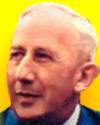 | (Asteroids are )" the vermin of the skies." (Asteroids can block objects of interest on astronomical photographs.) |
 | "Mineral substances vary greatly in color, transparency, luster, brilliance, odor, taste, and other properties which are shown by their strength and weakness, shape, and form. They do not have the variety of origins that we find not only in living matter but also in original matter. Moreover they have not been classified like the latter on the basis of the place where they pass their life since mineral substances lack life and with rare exceptions are found only within the earth. They do not have the differences in characters and actions which nature has given to living things alone. Great differences are not the essential features of minerals as they are of living and original matter." |
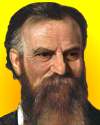 | "The glories and the beauties of form, color, and sound unite in the Grand Canyon - forms unrivaled even by the mountains, colors that vie with sunsets, and sounds that span the diapason from tempest to tinkling raindrop, from cataract to bubbling fountain." - John Wesley Powell, American geologist and ethnologist (born 24 Mar 1834) |
| QUIZ | |
| Before you look at today's web page, see if you can answer some of these questions about the events that happened on this day. Some of the names are very familiar. Others will likely stump you. Tickle your curiosity with these questions, then check your answers on today's web page. | |
| Births | |
 |  Four Nobel Prize winners share 24 Mar as their birthday. Joseph H. Taylor (born 1941), John Cowdery Kendrew (1917), Adolf Butenandt (1903), and Peter Debye (1884). In different years, three won the Nobel Prize for Chemistry, and the fourth was awarded a Nobel Prize for Physics. Four Nobel Prize winners share 24 Mar as their birthday. Joseph H. Taylor (born 1941), John Cowdery Kendrew (1917), Adolf Butenandt (1903), and Peter Debye (1884). In different years, three won the Nobel Prize for Chemistry, and the fourth was awarded a Nobel Prize for Physics.  Which scientist won the Nobel Prize for Physics? Which scientist won the Nobel Prize for Physics? |
 |  Georgius Agricola, born 24 Mar 1494, was a German scholar and scientist known as "the father of mineralogy," who made fundamental contributions to mining geology and metallurgy, mineralogy, structural geology, and paleontology. He was among the first to found a natural science upon observation. He may have coined the word "petroleum." Georgius Agricola, born 24 Mar 1494, was a German scholar and scientist known as "the father of mineralogy," who made fundamental contributions to mining geology and metallurgy, mineralogy, structural geology, and paleontology. He was among the first to found a natural science upon observation. He may have coined the word "petroleum." |
| Deaths | |
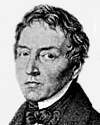 |  In 1849, a German chemist died, who remains noted for identifying "triads" of elements. He noticed a pattern among three elements with similar chemical properties, chlorine, bromine, and iodine - that the atomic weight of Br was the arithmetic mean of the atomic weights of Cl and I; and the properties of the three elements varied in an orderly manner, from Cl to Br to I. He found two other such triads - calcium, strontium, barium; and sulfur, selenium, tellurium. In 1849, a German chemist died, who remains noted for identifying "triads" of elements. He noticed a pattern among three elements with similar chemical properties, chlorine, bromine, and iodine - that the atomic weight of Br was the arithmetic mean of the atomic weights of Cl and I; and the properties of the three elements varied in an orderly manner, from Cl to Br to I. He found two other such triads - calcium, strontium, barium; and sulfur, selenium, tellurium.  Can you name this chemist? Can you name this chemist? |
| Events | |
 |  On 24 Mar 1976, President Ford initiated a national program to give the entire U.S. population inoculations against a strain of influenza virus that experts had identified as a possible "killer flu." It was first identified at Fort Dix, N.J., and concern that the virus could possibly be an emergency on the scale of the 1918 Spanish flu resulted in an unprecedented nationwide vaccination effort. On 24 Mar 1976, President Ford initiated a national program to give the entire U.S. population inoculations against a strain of influenza virus that experts had identified as a possible "killer flu." It was first identified at Fort Dix, N.J., and concern that the virus could possibly be an emergency on the scale of the 1918 Spanish flu resulted in an unprecedented nationwide vaccination effort. By what name was this flu virus known? By what name was this flu virus known? |
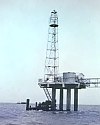 |  On Mar 24 of a certain year, the first U.S. seagoing oil drill rig (for drilling in over 100 feet of water) was placed in service by the U.S. company C.G. Glasscock Drilling Co. On Mar 24 of a certain year, the first U.S. seagoing oil drill rig (for drilling in over 100 feet of water) was placed in service by the U.S. company C.G. Glasscock Drilling Co. In which decade was this oil rig placed in service? In which decade was this oil rig placed in service? |
| Answers |
When you have your answers ready to all the questions above, you'll find all the information to check them, and more, on the March 24 web page of Today in Science History. Or, try this link first for just the brief answers. Fast answers for the previous newsletter for March 23: Wernher von Braun; volcanic action; vanadium; the decade including the year 1982; Gemini III. |
| Feedback |
 If you enjoy this newsletter, the website, or wish to offer encouragement or ideas, please send feedback by using your mail reader Reply button. If you enjoy this newsletter, the website, or wish to offer encouragement or ideas, please send feedback by using your mail reader Reply button. |
--
If you do not want to receive any more newsletters, this link
To update your preferences and to unsubscribe visit this link
If you do not want to receive any more newsletters, this link
To update your preferences and to unsubscribe visit this link
! !



Δεν υπάρχουν σχόλια:
Δημοσίευση σχολίου